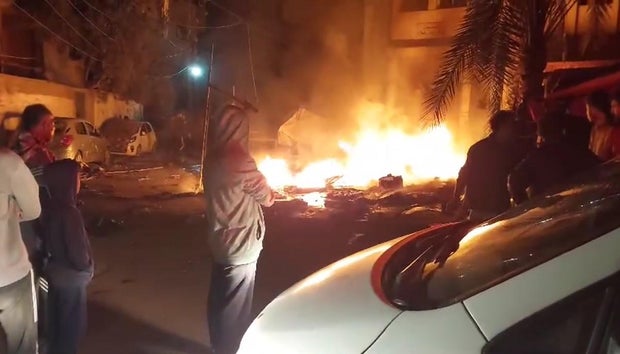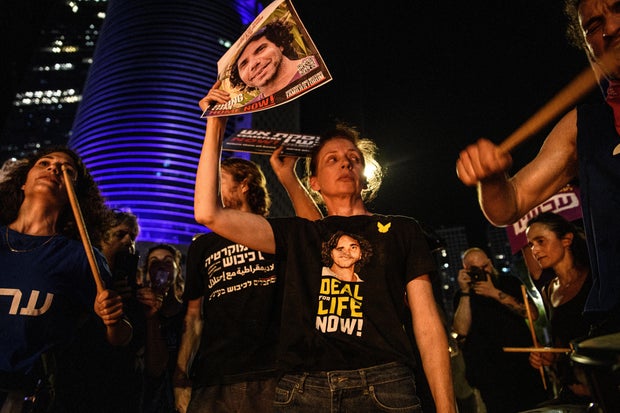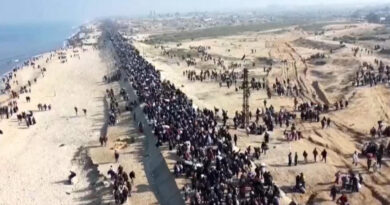Israel-Hamas ceasefire deal brings hope, but Gaza bombing continues as hostage families hold their breath
The deal reached between Israel and Hamas for a Gaza ceasefire and hostage release immediately brought jubilation to thousands of people across the decimated Palestinian territory, but both there and on the streets of Israel, hope was still constrained by anxiety on Thursday morning. The jitters were fueled by both increasing bloodshed in Gaza, and doubt cast by Israel’s leader on the solidity of the deal announced the previous evening.
Prime Minister Benjamin Netanyahu said Thursday that a “last-minute crisis” with Hamas was delaying Israel’s final approval of the long-sought truce. Israeli media reports suggested the delay was likely down to Netanyahu trying to buying time to deal with nationalist hardliners in his cabinet who’ve always fiercely opposed any agreement with Hamas.
But it is fragile deal, and the logistics of it will be extremely complex — even Hamas getting the hostages safely to a handover point will present significant security challenges.
The agreement is not set to take effect until Sunday, and with Israel’s military increasing attacks in Gaza rather than easing them in the wake of the deal — and none of the roughly 100 hostages expected to come home for several days — nobody who spoke with CBS News on either side of the border seemed ready to take for granted the peace looming tantalizingly just over the horizon.
In Gaza, “a new chance to live”
For Gazans, it was the best possible news. Hearing that the relentless bombing of their towns and villages would stop on Sunday brought overwhelming relief and joy.
One little boy who spoke to CBS News’ team in the enclave summed it up in three words: “We’re going home!”
Mahmood Kurdia, who’s been living in the southern city of Khan Younis after being forced from his home in northern Gaza, said he couldn’t wait to get back, even though he knows he has virtually nothing to go back to.
“I want to go back home to see my family, my neighbors and my home. Even though my home is just ruins now, but I still want to see it. I want to remove the rubble and put my tent on the top of the ruins and say to Israel that I’m back,” he told CBS News on Wednesday.”
Like everyone else, however, he was keenly aware that peace, if it is coming, is still three days away.
Israel appeared to ramp up its strikes Wednesday evening, killing more than 70 people between the ceasefire deal being announced and Thursday morning, according to the Hamas-run Gaza Ministry of Health and the enclave’s Civil Defense rescue agency. Both agencies told CBS News that the dead including 21 children and 24 women.
CBS News
Still, Kurdia couldn’t help cling to hope.
“This news means a new chance to live,” he said. “This means a new chance for us to live and watch our children live, grow and get education. It is just a new hope for survival. This is the ceasefire deal we hope to get.”
Israeli hostage’s cousin happy — but “not breathing”
In Tel Aviv, a small crowd gathered Wednesday night on the spot where protesters have, week after week, demanded that Israel’s government bring the remaining hostages home.
Yifat Kalderon was among them. Her cousin Ofer was among the 251 people kidnapped during Hamas’ Oct. 7, 2023, terrorist attack that saw militants kill some 1,200 people, and which sparked the war that has raged for almost 480 days.
Ofer was among the dozens of people kidnapped by the gunmen who stormed Kibbutz Nir Oz. Over the age of 50, he should be among the hostages released by Hamas in the first phase of the three-phase ceasefire agreement.
But asked if she felt a huge relief on Wednesday night, Kalderon made it clear that emotion would have to wait.
“No,” she said. “I’m going to feel a huge relief when it’s going to be done. When are we going to get all the 90-98 hostages alive and the dead ones back home.”
Matan Golan/SOPA Images/LightRocket/Getty
With bombs still falling in Gaza and little to indicate any new level of trust between Israel and Hamas, hostages’ families all across Israel were left to keep waiting, and worrying about everything that could still go wrong.
“I’m not saying that I’m not happy,” Kalderon said. “But I’m trying to, you know, take care of myself, not to be, you know, I don’t want to – I want to see them, first of all. Until I’m going to see them crossing the border… I’m not going to believe anything.”
“I’m not breathing until that — we’re going to get them all back home.”








